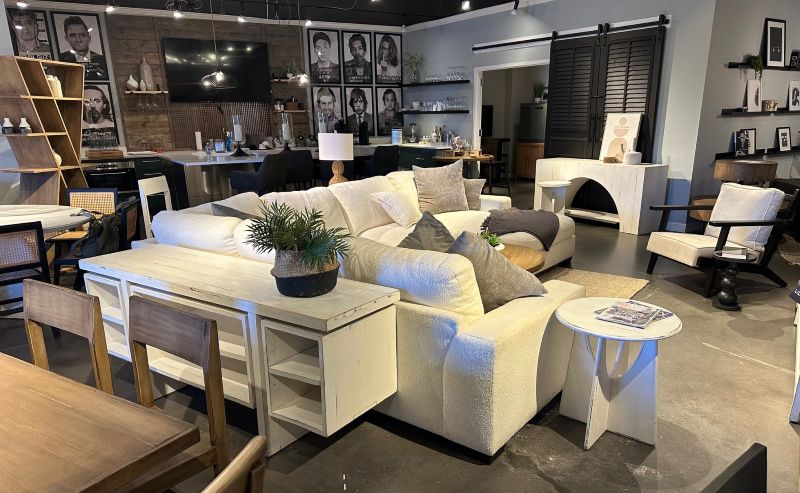Uncertainties are said to be causing some retailers to delay decisions on product purchases
HIGH POINT — Tariffs dominated many conversations at the recently concluded premarket, but no one has any better answers relating to the situation than they did some two months ago at the January Las Vegas Market.
That’s largely because many are waiting until April 2 to learn not only whether there will be 25% tariffs on Canada and Mexico, but if there will be tariffs placed on other countries around the world, including Vietnam and Malaysia, for example.
“Most of our retailers are on a wait and see,” said Kelly Hahn, chief creative officer at case goods resources Design Works and Urban Design Collective, the latter of which sources much of its product mix from Mexico. “What it’s done is make the retailer pause, so we have a bunch of business that is on the verge of closing or was on the verge of closing, and every time there is a delay it just pushes out that decision.”

He added that because of the speed to market that Mexico offers, the company had hoped to have more product on floors by now.
“Even if we’d gotten an order in late January, early February, we would have been able to ship one cutting before market,” he added, noting that about half the High Point showroom is Mexican-made product. “It is completely differentiated from what other people are trying to do.”

Gabriele Natale, president of motion upholstery manufacturer Man Wah USA, said premarket was positive in that the company saw all the retailers who were in town. The showroom featured mostly inline goods including some product shown at the winter Las Vegas Market.
“How productive it was, I don’t know, because for the most part, people wanted to talk about tariffs, they wanted to talk about tariffs and they wanted to talk about tariffs,” he said. “But when it comes to that topic, we really don’t know. … There is nothing to talk about because there is no direction whatsoever. All we can do is sit back and wait for what it is going to be.”
But even though the product it sells to the U.S. is largely from Vietnam, where tariffs are not yet part of the discussion, many buyers were still focused on tariffs — including those that could be placed on Vietnam.
Jeremy Hoff, chief executive officer of Hooker Furnishings, said that moods were largely positive among those buyers who stopped in at premarket.

“We all still hold on to the idea that things will eventually turn up because they kind of have to, but there are a lot of things going on that are creating a little bit of anxiety,” he said. “With tariffs and how quickly things are moving and some of the unknowns, we all have some understandable anxiety, but overall the people we saw were cautiously optimistic.”
With most of its case goods mix and imported upholstery coming from Vietnam, the company is not facing tariffs like those proposed on Mexico or Canada or those imposed on China in February. Still, the company is keeping a close eye on the situation.
“We are all trying to mitigate it, manage it and do what we can on it,” Hoff said. “I am grateful we have a really good team overseas that is helping us manage our way through this, because it is a lot and it is coming fast and furious, so you better have people on it.”
Other companies such as Vaughan-Bassett and Bassett Furniture highlighted their U.S. capabilities.
In Vaughan-Bassett’s case, that includes a U.S.-made line of solid wood and veneered bedroom furniture. In recent months, the company has seen increased inquiries from retailers looking for a safe haven from imports facing tariffs. Calling the domestic model risk free and tariff free, company CEO Wyatt Bassett also noted that as demand rises, the company can increase its output by adding hours and hiring more people.
“We have a tremendous amount of upside potential that we can put in place quickly,” he noted of its ability to boost capacity.
Bassett Furniture offers a line of domestic upholstery produced in its Newton, North Carolina, plant and a line of domestic case goods available through its BenchMade dining, bedroom and occasional furniture program produced in Bassett and Martinsville, Virginia, that represents roughly half its wood volume.

And while some imported fabrics face tariffs, the domestic lines are largely produced with U.S. materials and components, giving dealers a product mix that avoids tariffs.
“We feel this is pretty much tariff-free product,” said Matt Johnson, vice president of sales, of the BenchMade line, noting that dealers, including those who came by at this week’s premarket, expressed interest in the domestic product mix.
But imports made up much of the mix seen at other companies showing at premarket ranging from motion upholstery to wood bedroom and dining produced in Asia.
At premarket, sister companies SLF and Pulaski had a large introduction of new product produced in Vietnam which was in development before tariffs became a serious discussion. At SLF, this included seven new standalone bedrooms and two bedroom and dining collections, while Pulaski showed seven new bedroom and dining collections.
Page Wilson, president of both divisions, said that while there were not as many customers this time, the moods of those who did stop by the High Point showrooms were good.

Still, there were underlying issues in addition to tariffs that he believes likely impacted attendance levels.
“It’s tariffs, it’s interest rates, (store) traffic — pick one or all of the above,” he said, adding, “Everyone is saying it is costing a lot more to get customers in the door. The advertising outlay is big. It is still extremely tough and not everyone can afford to do that.”
Of tariffs, he said, some customers are more concerned than others, including larger customers that rely heavily on direct shipments from overseas.
“For some of them, it is issue No. 1,” Wilson said, noting that while it is particularly of concern for those buying from China and Mexico, for example, “Others are just talking specifically what is going to happen in Vietnam.”
While it still gets some product out of China, Liberty Furniture largely sources from Vietnam and Malaysia, two countries that haven’t been dragged into the tariff discussion yet. Thus, the company drew interest from retailers on many of its market introductions including some new fabric motion upholstery along with its additions to its entry-priced casual dining line, featuring table and four chair sets targeted to retail from $699 to $899.
“We try to be as show-ready as we can,” Jonathan Cowles, executive vice president, told Home News Now of the showroom being roughly 70% market-ready.
He also noted that while some customers who typically come to premarket weren’t here this time, he said the company’s overall attendance was strong this time around.
“We’ve been happy with the turnout at premarket,” he said. “In terms of attendance, the numbers are probably actually a little bit above where we’ve been.”
Of tariffs, he said that many are hoping for some more definitive answers on the issue soon.
“As we head into market, hopefully there will be some additional clarity,” adding that as that happens, “There is an opportunity to partner with your retailers to try to find the best solution to get through it.”
Hoff, of Hooker Furnishings, noted that in addition to tariffs of foreign-made goods, the company also is monitoring situations around the globe ranging from Venezuelan oil to timber supply and reciprocal tariffs that could also impact global trade. But he also noted that it’s best to not over focus on issues beyond one’s control and instead focus on those that you can control.
“The only way you can stay calm enough in this environment is to know that you have a good enough plan and that you don’t live too much in the future — you live here in the present. Otherwise it’s going to be too much.”





Tariff’s
It’s not a fun word for the American consumers.
It’s the idea that everything will cost a lot more.
That thought will 100% make you think twice before you buy anything today, especially furniture!
It would be fantastic if furniture would come back to being built here, however that could take years and many manufacturers don’t have the luxury of waiting it out.
If the tariffs magically go away, then the furniture industry can get back on track and concentrate on
selling more merchandise rather than be in that fear mode we find ourselves in now.
This is a man made problem that shouldn’t have happened in the first place and was not thought out properly before its execution.
Well said, Tommy. This offers another perspective on the issue that we all should take into account!